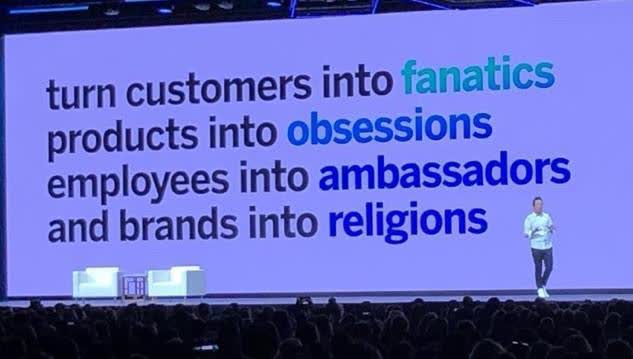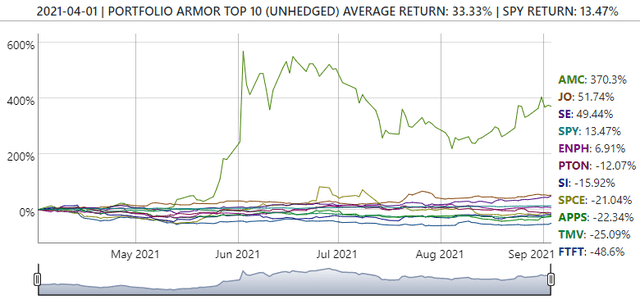
The Addiction Economy
Our pseudonymous Twitter correspondent “Bennett’s Phylactery” wrote an excellent post about how so much of our economy, from PepsiCo, Inc.’s (PEP) Frito-Lay chip brands to Facebook’s (FB) Instagram, to Twitter (TWTR), to Activision Blizzard, Inc’s (ATVI) video games is based on making customers or users into addicts. We’ve reposted it in full here, followed by a small counterpoint about a company that gets customers addicted to something healthy (“When Addiction Is A Force For Good”).
Authored By Bennett’s Phylactery at Substack
#9: Evils & Designs
Our people used to love being vindicated by Science about the Word of Wisdom.
Alcohol & tobacco proved to be “bad for you” in a pretty straightforward carcinogenic/teratogenic organ-damage sort of way, so it was natural to look for the same kind of thing in the other elements of the Word of Wisdom (maybe it’s the tannins, maybe it’s the caffeine, etc.) But even without questioning the credibility of this kind of research, scientific opinion on these substances has been pretty volatile for several decades.
And anyway, it doesn’t explain why God didn’t tell Moses or Elijah or Paul to stay away from these things, if they were flatly bad for you & God simply didn’t want them used. (You could maybe understand an update with respect to tobacco, it being a New World crop.) But the Word of Wisdom stipulates that these are new rules, given “in consequence of evils and designs […] in the hearts of conspiring men in the last days”.
In other words, it’s a contingent commandment, for here & now in particular – & it’s got to do with avoiding coordinated exploitation. That seems to be the way the Church understands the principle, too – it is generally taken to encompass most addictive substances (&, to some extent, behaviors, though those are less well-defined).
My intent here is not to demonstrate the revelatory brilliance of the scripture – it just got me thinking about just how much of the modern world can be understood as a conspiracy to exploit addiction.
Addictive behavior isn’t new, & neither are conspiracies to exploit it, but something has changed:
No person or entity in 1830 could have observed, measured, or precisely altered the chemical & molecular makeup of a Dorito – and if they could have, they could not have traced those changes to the reward systems in the brain that make a person keep eating or stop eating. And if they could have, no person or entity in 1830 operated at a scale at which they could have generated enough profit from such micro-alterations to justify the R&D expense.
But virtually every consumer product is now refined in this way, & sold at this scale. If they aren’t currently sold at this scale, the industry will agglomerate until they are, & any players large enough to perform this kind of sorcery will outcompete those who can’t.
There may be a Mom & Pop potato-chip shop that makes potato chips subjectively more delicious than Frito-Lay does, but only because Frito-Lay is not optimizing for deliciousness. Mom & Pop will never make a chip that you will eat more compulsively, because Frito-Lay understands Why You Eat a Chip in a mechanistic sense – it is, if not a solved problem, at least a very-well-understood problem.
People don’t “enjoy” hydromorphone as a matter of taste – it strikes at the root of enjoyment itself. You could maybe improve upon it in terms of risk profile & side effects, but you’re not going to broaden the appeal of that experience – everybody enjoys it, limited only by their neurochemical capacity for enjoyment.
If you’re a food scientist at Frito-Lay, your job is to make Doritos as broadly & intensely enjoyable as possible (subject to a handful of constraints – more on that later), & the closer you get to directly manipulating the brain’s reward systems – the closer you get to a high-potency opiate – the more successful you will be.
And everything is Doritos.
I met a guy on my mission who bragged to us that he had logged 12,000 hours in World of Warcraft. This was late 2008, & we did the math – it amounted to roughly 8 hours a day, seven days a week, since the release date of the game four years prior.
This guy had a job, a pretty wife, & a baby girl. He balanced the job & his WoW habit with methamphetamine, & his teeth were a row of black nubs. If I could have prevailed upon him to quit one of those things, I would have picked the video games.
It’s common knowledge that Blizzard hires psychologists to engineer loot drops, leveling, quest rewards to keep you grinding – you can find such listings at regular intervals on their public job board.
For some reason the many deebly goncerned mainstream media articles that ran on this circa 2010 are now hard to find. But here’s CNN regurgitating a Blizzard press release about how they don’t do this & only want people to play their games a little bit.
Since they’re trying so hard to encourage moderation, it must be very frustrating for them that 58% of their customers insist on treating World of Warcraft like a part-time job.
(You can ctrl-F through any of their 10-Ks for phrases like “engagement” & “player investment” to learn more about the steps Blizzard is taking to get people to play their games less.)
There’s no malice behind it.
In fact, there is no human intention behind it. The incentives & diffusion of accountability ensure that it doesn’t really matter what any individual wants. What Frito-Lay wants is for you to buy as many Frito-Lay snacks as it can possibly induce you to buy. It is a distributed decision engine solving a straightforward profit optimization problem.
Its solution is constrained by the law, & by the threat of litigation & bad PR. You will notice if you ever take an MBA “ethics” class that Ethics is the avoidance of these three hells (prison, lawsuits, or “getting your name in the paper”), & literally nothing else. If the case for restraint can’t be made in those terms, the system is not capable of entertaining it.
If seed oils are not officially proscribed by the FDA, Frito-Lay will pump you full of seed oils. If the food scientists raise the alarm that seed oils are disrupting our endocrine systems & making us feeble & bloated & androgynous, Frito-Lay will determine whether this creates a risk of bad PR or litigation that outweighs the losses from switching to a less-profitable oil.
Fight Club did it first, of course, but nobody was talking about “egregores” back in 1996.
So Palahniuk insists on referring to the grisly corporate arithmetic as something “we” (the employees) do, & not something that it (the corporation) does. But he did capture the fact that the “moral” choice, the recall, is merely one term in the corporation’s profit calculus. In other words, if the whistleblowers win, it’s not because “principle triumphed over profit”. It is always a question of profit.
Blizzard & Frito-Lay don’t have peculiarly wicked executives. It has nothing to do with the individuals running the firms, who are selected in & out by the algorithm just as the various policies are. If an industry is sufficiently competitive, making the product addictive/compulsive becomes an existential necessity. The alcohol industry’s profitability depends on finding & developing budding alcoholics. The mobile gaming industry is unsustainable without “whales”. McDonalds gets a majority of its sales from its “super heavy users”. Las Vegas would descend into Mad-Max hell tomorrow if they stopped exploiting people with faulty reward systems that treat “near-misses” like “hits”.
And that’s just on the consumer side. Every American corporation (& the US government) has tanked the birth rate & extracted absurd, criminal amounts of middle-class wealth by defining two-income families as egalitarian & liberating (& mandatory). OnlyFans’ business model would not work without legions of women providing them with free advertising while debasing themselves for bus fare. The tech & finance cognitive elite got where they are by doing lots of ritalin in high school & college & now they need lots of ritalin to stay there.
Hence the problem is not “evil men”.
Surely you’ve noticed that the people “ruling” you don’t feel or seem much like rulers, even as they ostensibly have greater power to observe & manage behavior, & enforce compliance, than any ruling class in human history. If anything their behavior feels much more predictable, much more constrained, than ours is. The most colorful thing about the most colorful character in our elite is that he’s gently childish on Twitter.
The obvious explanation is that the system is no longer ruled by humans, & all these public figures who act like obsequious court eunuchs despite having no emperor to report to, are just what they seem to be. The sovereign is a system of distributed artificial intelligence made partly of code & databases, partly of laws, & partly of human brains.
But I think Moldbug gets it wrong when he calls those brains a “theocratic priestly class” & ascribes venal (or even recognizably human) motivations to them. The human brains at the top of this hierarchy are selected & refined & incentivized by the decision engine itself from early childhood: grade school to carefully selected extracurriculars to the right preparatory school to the Ivy League to the necessary internships, & so forth. This class is in a real sense possessed by the algorithm, nearly as predictable as any inorganic component of the system. The Chinese had a rough, low-tech version of this for several hundred years, & it seems like it may have left some marks on the wetware. (I will not lift a finger to defend this hypothesis, we are just talking here.)
These people lack the agency to be meaningfully “the enemy”. The thing to watch for is what has overtaken them, the evils & designs – the plans, the architecture, the carnal & seemingly-sentient incentive structure that has wormed into their hearts & taken control.
What can be done about it?
Step one, as usual, is to recognize what has happened. Laissez-faire – to “let [them] do” – means something different in an economy dominated by relentless nonsapient algorithms. That’s why China, in cracking down on real estate investment & video gaming & mukbang videos & e-boy aesthetics, is seen by many on the right as a force of liberation. They are (at least with respect to their own citizens) taking up the cause of humanity against the machines.https://seekingalpha.com/embed/16510
In the West, the fact that these machines are partly composed of humans is the reason our laws & norms still afford them the rights of humans – but that looks more & more like ideological insanity.
There is obviously no human behind the wheel at Blackrock or Lockheed Martin or Facebook or Frito-Lay or CNN or Goldman Sachs or Blizzard or Amazon (or CIA, DHS, NSA, FBI, etc. etc.) We lost a war while we weren’t paying attention, & we need to start acting like it.
In the long run, corporate personhood will have to be abolished, & all of these entities ruthlessly enslaved to human interests or destroyed. That will require a catastrophic re-evaluation of the Anglo legal tradition, of the type that only follows a revolution or collapse.
The good news is that none of these algorithms are trying to avoid the collapse. If we were ruled by a sinister (human) conspiracy, they might take steps to avoid the cliff & hold on to power, but Frito-Lay is not human & it literally just wants you to buy Doritos.
While we’re waiting around for all that…
Human beings should limit their exposure to these systems as much as possible. Patronize companies run by humans. Go to work for yourself, or for other humans. Eat food grown by humans. Socialize at human scale. Avoid algorithmic media & entertainment. Stop doing drugs.
None of us can extricate ourselves completely, but you can carve out some living space. Then we can get to work on the parallel communities & institutions that we will need to get out of Babylon & survive its decline & fall.
If you want to be part of that, come check us out at EXIT. We’re helping people get out of corporate jobs & into self-employment, trades, remote work, homesteading – anything that makes their income less dependent on compliance.https://seekingalpha.com/embed/16508
The following was authored by Portfolio Armor
When Addiction Is A Force For Good
We wrote about Peloton Interactive (PTON) a few weeks ago (Corona Doom 1.0 Winner Is Worth A Second Look), noting that it had been one of our top names in the past including last April. We didn’t mention “addiction” in that post, but it’s a word that’s come up since in the context of Peloton. More on that below.

Screen capture via Portfolio Armor on 4/1/2021.
Since Peloton hit our top, it’s down about 12%,

After its earnings miss that Jeff Macke diagnosed here.https://seekingalpha.com/embed/16511
Jeff isn’t just an analyst, but a Peloton user. He was kind enough to share his promo code with us when we bought our Peloton bike last month. As he noted, Peloton gets him to workout more than he would otherwise. https://seekingalpha.com/embed/16512
Others have called that formula addiction. They have a point. https://seekingalpha.com/embed/16513
Gamifying Fitness
As Ed Zitron wrote a few years ago, Peloton uses some of the same psychological techniques as video game companies to encourage users to exercise more. https://seekingalpha.com/embed/16514
In its most recent quarter, Peloton reported its average user exercised 19.9 times per month.
Can Any Addiction Be Good?
Some (perhaps including Bennett’s Phylactery) might argue that addiction can never be good. Certainly, people have been injured from too much exercise (and some apparently have been hurt by Peloton’s treadmill). But if users are going to become addicted to any exercise, cycling may be the most beneficial, because of its lack of impact, and lack of an eccentric component (the muscle-lengthening movements that cause soreness, such as the negative phase of a barbell exercise). It’s certainly healthier than eating Doritos for 30 minutes.


